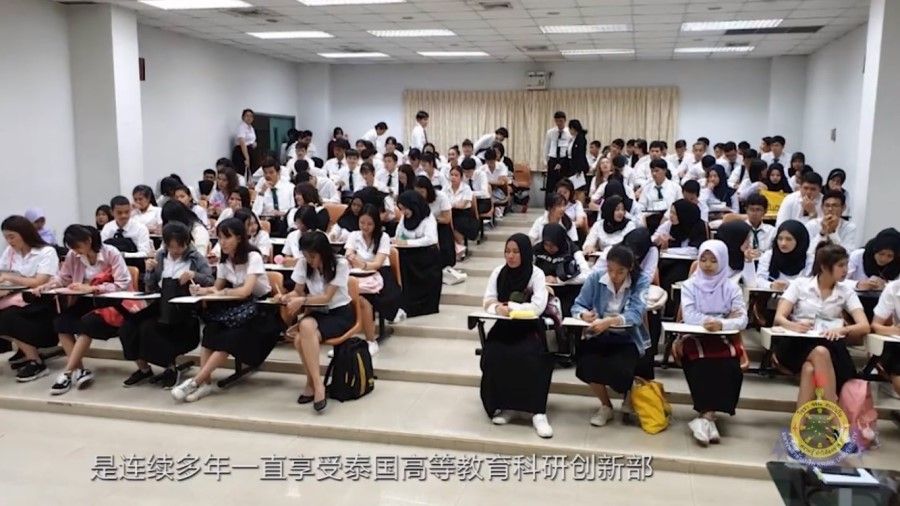Chinese investment into Thai private universities: The need to keep standards up

There are concerns that Chinese students studying in Thailand are being taken advantage of through inflated prices and dishonest marketing. In 2021, the Chinese embassy in Bangkok put out a statement warning Chinese students not to apply to unverified degree programmes run by international colleges and private universities. The embassy advised Chinese students to carefully review programmes offered through foreign education agencies or the universities themselves.
Inadequate control of educational quality
According to a Chinese embassy officer interviewed in 2018, this issue has been a concern for many years. The officer said that many Chinese students were upset about misleading advertisements and unrecognised degrees. They expressed dissatisfaction about the accountability of lecturers, unclear grading methods and overcharging of fees. Chaiyapruk Serirak, then permanent secretary of the Ministry of Education said in 2016 that the bureau was investigating the Chinese students' complaints about the "profit-driven education programmes" in some private universities.
Foreign education agencies are the main actors in promoting these programmes and enrolling students from China. A private university officer, who prefers to remain unknown, states that the agencies control the management cost by coordinating how the courses are run. For instance, they will schedule the semester break around the Chinese New Year holiday or design a course with a duration of 30 days to accommodate Chinese lecturers on tourist visas in Thailand. This would help to reduce management costs.
...assessments of quality tend to place more emphasis on written reports than on actual implementation. This often results in inadequate control of educational quality.

The Thai authorities are unable to regulate the curriculum standards of these private universities. In theory, the Ministry of Higher Education, Science and Innovation (MHESI) and the Quality Enhancement on Higher Education Management Division are in charge of supervising and ensuring quality assessments at all public and private universities in Thailand. However, assessments of quality tend to place more emphasis on written reports than on actual implementation. This often results in inadequate control of educational quality. The complaints that have surfaced underscore the unsatisfactory quality of Thai higher education.
Chinese acquisition of Thai private universities
Along with the rise in Chinese students in Thailand, there have been discussions regarding the takeover of private universities by Chinese stakeholders since 2019. In December 2022, the deputy permanent secretary of MHESI, Supachai Patumnakul, revealed that three private universities - Krirk University, International Stamford University (ISU), and Metharath University (formerly Thaksin University - have Chinese shareholders.
Supachai clarified the legal status of these universities, referencing the Foreign Business Act (1999) in stating that foreign university ownership is permitted as long as Thai nationals own more than 50% of the institution. Thus, there is no dispute regarding the legal status of these universities.
...the high demand for education in China had contributed to the intense competition for admission into Chinese universities.
Some sources mentioned that over ten private universities are discussing acquisitions with Chinese businessmen.
Three factors contribute to the interest of Chinese stakeholders in Thai private universities. First, the high demand for education in China had contributed to the intense competition for admission into Chinese universities. Increasing the number of higher education institutions overseas will help to ease the demand.
Second, due to a shrinking local population and relatively slow technological advancement, higher education institutes in Thailand face a decline in enrolment. This affects Thai private universities more, since they charge considerably higher tuition fees and have a lower reputation than public universities. Chinese investors are a financial solution to the issue.
Third, the strengthening of economic ties between Thailand and China - due to the Eastern Economic Corridor (EEC) project - positions Thailand as a desirable candidate for acquisition.

Regulation and greater liberalisation of education sector
With the expansion of Chinese co-ownership in Thai universities, the concerns of Chinese students regarding the education quality of programmes should be addressed. Thai authorities will need to pull their weight to achieve the educational standards they envision while keeping the delicate balance between investment and education quality in Thailand.
In the short term, the Office of Higher Education Commission should draft specific regulations for international programmes. This would cover areas such as academic proficiency, programme advertisement, class management and financial auditing. In practical terms, a new agency should be formed to keep tabs on the quality of the registered international curricula. In the case of courses that fail to pass the educational quality assessment, the forfeiture must be strictly enforced and monitored by the established bureau.
Also, MHESI should incorporate technology into the educational quality assurance process for the transparency and reliability of the programmes. For instance, a digital survey should be used to evaluate more samples. This would enable students' and graduates' satisfaction with the curriculum. It can also be used to investigate employers' perceptions of graduate students' efficiency in job performance.
The rigour and seriousness of government agencies is a necessary cost in order to maintain the reputation of the Thai education system.
To ensure the quality of its graduates, the government should revise its policy in the medium to long term to place greater emphasis on the internationalisation of Thai higher education. For example, the educational service sector should be liberalised to facilitate the investment of foreign universities into Thai campuses. This can be done by establishing specific regulations on foreign investment in higher education institutions, such as abolishing the foreigner quota system (4 locals for every foreigner in the workforce). This would attract foreign universities with international standards, advanced curricula, and qualified personnel, thereby enhancing the level of competition and quality of Thai education.
Meanwhile, the Thai government should subsidise potential institutions to develop a more internationalised environment and infrastructure. They should facilitate a transnational credit transfer accreditation system between foreign and Thai universities. The rigour and seriousness of government agencies is a necessary cost in order to maintain the reputation of the Thai education system.
This article was first published by ISEAS - Yusof Ishak Institute as a Fulcrum commentary.
